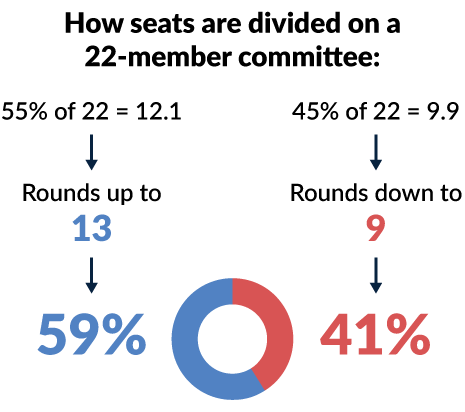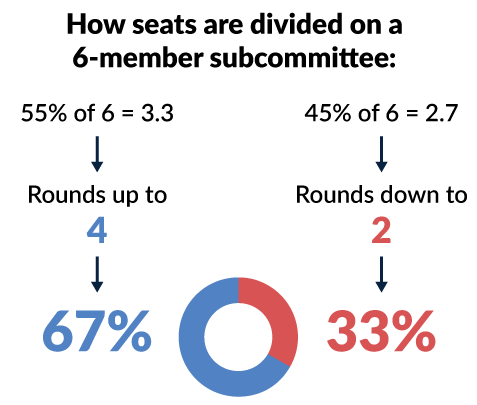
shared control of the House of Delegates occurred only in 1997-99, when there were 50 delegates caucusing with each of the two political parties
Source: Virginia General Assembly, About the Capitol - High School

shared control of the House of Delegates occurred only in 1997-99, when there were 50 delegates caucusing with each of the two political parties
Source: Virginia General Assembly, About the Capitol - High School
The House of Delegates has 100 members. Whenever there is a tie vote, the proposal is defeated.
For example, in 2019 the State Senate passed a resolution to ratify the proposed Equal Rights Amendment to the US Constitution. In the House of Delegates, which had 51 Republicans, supporters and opponents were split along party lines.
Delegate David Yancey, a Republican who had been elected in 2017 by pulling his name out of a bowl after the total vote in his district ended in a tie, indicated he would support passage. Other Republicans hinted that they would too, but were not forced to cast any vote because the bill was killed in the Privileges and Elections committee. Only the members of that committee would be on public record regarding the issue. Everyone else could run in the November, 2019 elections with expressions of support for the goals of the Equal Rights Amendment but no obligation to defend an actual vote.
The last effort of the Democratic minority was to change the rules of the House and "discharge" the bill from the committee. That would allow for a vote on the floor by all 100 members. The Democrats waited until the end of the session, because one seat had been empty and the political balance was 51-48 for most of the session.
State Senator Jennifer Wexton had been elected to the US Congress in 2018, and then Delegate Jennifer Boysko from the 86th District won the special election to fill her empty State Senate seat the day before the regular General Assembly session opened on January 9, 2019. Another special election was held on February 19 to fill the seat emptied by the election of Del. Boysko to the State Senate. The regular session ended on March 3, but that one vote was crucial.
The proposed rules change failed on a 50-50 vote. As promised, Del. David Yancey supported it. All other Republicans voted no. In the House of Delegates, a tie vote blocks a bill from moving forward.
Though the Democrats were unable to bring the Equal Rights Amendment to the floor for a vote, their procedural maneuver forced all 100 delegates to vote on the issue. That created a track record for use during the campaign before the November, 2019 elections.1
At the start of a General Assembly session, there is no mechanism for resolving a tie vote when initially organizing the chamber. For the House of Delegates to do business, it must first elect the Speaker of the House who determines committee chairs and members. If there are 50 Democrats and 50 Republicans, the state constitution has provided for no tie-breaker equivalent to the Lieutenant Governor in the State Senate.
A 50-50 tie at the start of a session has been created once. The Democrats had 51 members in the House of Delegates after the 1997 election. Governor Jim Gilmore convinced Del. David G. Brickley (D-Prince William) to resign his seat and serve in the executive branch as the head of the Department of Conservation and Recreation. A similar offer convinced State Senator Charles L. Waddell to resign his seat, and that resignation shifted control of the State Senate to the Republican Party in 1998.
The chair of the Democratic Party complained about Gov. Gilmore's offers after the 1997 elections:2
There were three special elections on January 13, 1998, two to replace vacant seats which were clearly in Republican districts and one to replace Delegate Brickley. Republicans won all three, but the General Assembly session had started three days before those elections were certified by the State Board of Elections. The Virginia Supreme Court rejected a Republican effort to accelerate the post-election process and get the three new Republican delegates certified immediately.
With only 97 certified members in the House of Delegates at the start of the session, there were 50 Democrats, 46 Republicans, and one Independent. The Clerk of the House presided for five hours until a Speaker was elected. Through the debate, he refused to recognize the three new Republican delegates who we sitting in the chamber. The Democratic majority finally managed to re-elect Thomas W. Moss Jr. as Speaker, despite the uproar with Republicans "screaming, shouting, banging on the desks, cursing on the floor."3
When the three new delegates were sworn in, the Republicans also convinced the Independent to caucus formally with them. Delegate Lacey Putney had been elected first as a Democrat in 1961. He shifted his status to Independent in the 1967, as the conservative-liberal philosophies of Virginia's state political parties realigned to match the national parties.
When he chose to caucus with the Republicans in 1998, he created a 50-50 tie in the House of Delegates. For the first time in over a century, the Democratic Party did not control the House of Delegates in Virginia. With only 50 votes, however, the Republicans did not control the chamber either. They lacked the votes required to replace Speaker Thomas W. Moss Jr.4
Source: Library of Virginia, "Objection, Mr. Chairman!" - The Opening Session Of The 1998 House Of Delegates
A power-sharing agreement was reached after tense negotiations. It was adopted by a 90-2 vote and incorporated in the 1998-1999 Rules of the House of Delegates.5
Thomas Moss got to remain as Speaker. As Speaker, he assigned all members to all 20 committees, but this time he had to consider the recommendations submitted by the Republicans. His assignments reflected the reality that the Republicans had half of the power in the House of Delegates, and bills on issues such as charter schools and abortion could no longer be blocked with unrecorded votes in committees controlled by the Democrats.
Most committees were expanded from 22 to 24 members; the Appropriations Committee grew from 22 to 30 members. An equal number of Republicans were appointed to 19 of the 20 committees for the first time in the history of the House of Delegates. Committees were given co-chairs, and the chair rotated between members of each party. Some committee chairs switched places at the end of each legislative day, while others agreed to switch at the end of the year.
Democrats lost the ability to ignore the opposition even when the Republicans offered constructive proposals. Republicans who had previously been free to simply criticize the Democratic proposals had to take the responsibility of governing. Everyone had to learn how to do business in a changed environment, though partisan rivalry remained intense. In some situations, bipartisan coalitions emerged that addressed shared regional concerns.
Only the Rules Committee retained an unbalanced number of members, with eight Democrats and seven Republicans. Speaker of the House Thomas Moss appointed himself as the chair of the most powerful committee in the House of Delegates.
Republicans were delighted to see the Speaker humbled; they did not view him as a negotiator they could trust. There were hard feelings from past partisan actions. The party chair told a Washington Post reporter that:6

in the opening session of the 1998 General Assembly, negotiations finally concluded with a power sharing agreement - but the Speaker of the House remained a Democrat
Source: Library of Virginia, "Objection, Mr. Chairman!" - The Opening Session Of The 1998 House Of Delegates
Power-sharing had a major impact on lobbyists. In the past, they could focus their attention and campaign contributions on a small number of key leaders in one party. As authority was decentralized, lobbyists wre forced to deal with all 100 delegates. Del. Bob McDonnell (who was later elected governor) joked:7
The House Republican Leader commented:8
The conference committee which develops the final state budget was also transformed by the parity of the two parties in 1998. The State Senate ended up with a 21-19 Republican majority, and the House of Delegates was evenly split with 50 members caucusing with each party. The conference committee was expanded from eight to 12 members. For the first time ever, half were Republicans.
House Speaker Thomas Moss retaliated against Del. Lacey Putney by not appointing him to the conference committee. In the House of Delegates, the Speaker personally determines which legislator will serve on each committee. In a demonstration of his remaining authority and pique at the power-sharing agreement, Speaker Moss chose two junior Republicans rather than the Republican members with seniority for the all-important conference committee.9
The power-sharing agreement written in 1998 said it would last for four years, unless one party gained a majority of 55 seats or more. It was supposed to continue after the 2001 elections, unless one party won a majority of 53 or more seats.
After the 1999 elections, Republicans had 52 seats plus support from Independent Del. Lacey Putney, and elected a Republican as Speaker of the House. After the 2001 election, Republicans controlled 64 seats and had support from Independent Del. Lacey Putney. The 2001 elections ended the power-sharing agreement, but Speakers have continued to assign members to committees based on proportional membership in the House of Delegates.10
Rule 16a, adopted by the House of Delegates in the 2020 General Assembly, is the basis for apportioning committees:11
The "fractional number" provision gives the majority party excessive representation of committees and subcommittees, exceeding its percentage in the House of Delegates. In 2020, the Democrats had 55 members vs. 45 Republicans. In a 22-member committee, rounding up gave the Democrats a 13-9 ratio, or 59% of the votes in that committee. In a 6-person subcommittee, the Democrats "rounded up" to four members and Republicans got only two, a 67-33% ratio.12
Sometimes a bill that receives a majority vote in the House of Delegates will still be blocked. At least 51 members of the House of Delegates must support a tax bill for it to advance.
In 2020, a proposal to add a $0.05 tax on plastic bags was defeated by a 50-49 vote. Though House Bill 534 received a clear majority, the bill was one vote shy of the required 51. The vote was repeated and the bag tax proposal obtained a 52-46 majority on the second round, enabling the legislation to live for another day.13


rounding up fractional percentages gives the majority party extra voting power in committees and subcommittees
Source: Virginia Public Access Project, Proportional? It Depends